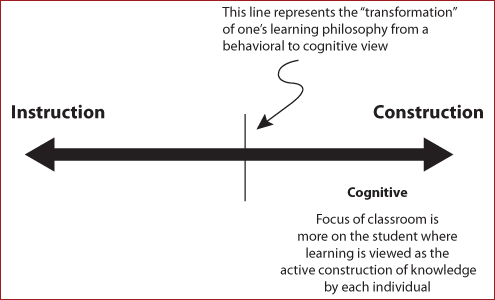| |
| |
|
| |
WHAT WE BELIEVE |
Constructivism: A Theory of Learning |
| |
Constructivism is basically a theory based on observation and scientific studyabout how people learn. It says that people construct their own understanding and knowledge of the world, through experiencing things and reflecting on those experiences.
The main proponents of Constructivism include Jean Piaget, John Dewey, Lev Vygotsky & Jerome Bruner.
When we encounter something new, we have to reconcile it with our previous ideas and experience, maybe changing what we believe, or maybe discarding the new information as irrelevant. In any case, we are active creators of our own knowledge. To do this, we must ask questions, explore, and assess what we know.
In the classroom, the constructivist view of learning can point towards a number of different teaching practices. In the most general sense, it usually means encouraging students to use active techniques (experiments, real-world problem solving) to create more knowledge and then to reflect on and talk about what they are doing and how their understanding is changing. The teacher makes sure she understands the students' preexisting conceptions, and guides the activity to address them and then build on them.
Constructivist teachers encourage students to constantly assess how the activity is helping them gain understanding. By questioning themselves and their strategies, students in the constructivist classroom ideally become "expert learners." This gives them ever-broadening tools to keep learning. With a well-planned classroom environment, the students learn HOW TO LEARN.
|
| |
| |
| We need to move from an Instruction to Construction Model of Learning- |
| |
Instruction To Construction |
| |
 |
| |
| Source: http://www.nowhereroad.com/twt/ |
| |
Contrary to criticisms by some (conservative/traditional) educators, constructivism does not dismiss the active role of the teacher or the value of expert knowledge. Constructivism modifies that role, so that teachers help students to construct knowledge rather than to reproduce a series of facts. The constructivist teacher provides tools such as problem-solving and inquiry-based learning activities with which students formulate and test their ideas, draw conclusions and inferences, and pool and convey their knowledge in a collaborative learning environment. Constructivism transforms the student from a passive recipient of information to an active participant in the learning process. Always guided by the teacher, students construct their knowledge actively rather than just mechanically ingesting knowledge from the teacher or the textbook. |
| |
| |
In Simple Words, Children |
|
| |
• |
Construct their own knowledge |
| |
|
|
| |
• |
Knowledge and meaning is through interaction between their experiences and their ideas |
| |
|
|
| |
• |
Play & real experiences are important |
| |
|
|
| |
• |
Every individual is unique |
| |
|
|
| |
• |
Thinking is a result of interaction with other children, adults and physical world |
| |
|
|
| |
• |
Responsibility of learning lies with children |
| |
|
|
| |
• |
Motivation is a result of self confidence |
| |
|
|
| |
• |
Learning is discovery |
| |
|
|
| |
• |
Teachers are facilitators - Children and teachers learn together |
|
| |
| |
Role Of Teachers In Children's Learning |
|
| |
• |
Understand children's developmental levels |
| |
|
|
| |
• |
Observe and interpret actions of each child in terms of developmental principles |
| |
|
|
| |
• |
Understand how children learn |
| |
|
|
| |
• |
Support learning-use multiple teaching methods |
| |
|
|
| |
• |
Attend to what children learn |
| |
|
|
| |
• |
Create environments for learning |
| |
|
|
| |
• |
Empower them to take control of their learning |
| |
|
|
| |
• |
Be conscious participant observers |
| |
|
|
| |
• |
Observe and interact with children to discover how each child thinks and reasons |
| |
|
|
| |
• |
Recognize each child's participation in terms of abilities/ offer appropriate support and challenge |
| |
|
|
| |
• |
Establish climate for positive social interactions |
| |
|
|
| |
• |
Encourage children's intuitional actions, problem solving and verbal reflections |
| |
|
|
| |
• |
Plan experiences according to children's actions and interests |
| |
 |
| |
| Source: http://elementsunearthed.com/tag/hands-on-learning/ |
| |
|
|
| |
• |
There are many different approaches to constructivist learning, depending upon the subject area or topic, the background skills of students and the learning objectives of the teacher. |
| |
|
|
| |
• |
No teaching is wholly teacher-centered or wholly student-centered. |
| |
|
|
| |
• |
Most classroom learning usually involves a mix of different learning experiences along a continuum between teacher- and student-centered approaches. |
| |
|
|
|
| |
|
|
|
| |
 |
|
| Our Educational Initiatives |
| |
 |
| |
 |
| |
|